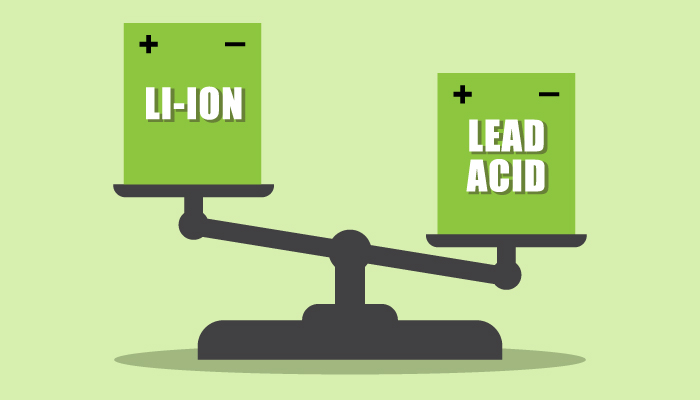We use cookies to make your experience better. To comply with the new e-Privacy directive, we need to ask for your consent to set the cookies. Learn more.
Forklift Batteries: Lead-Acid vs. Lithium-Ion
In 2015, the first lithium-ion battery pack for an industrial lift truck hit the market. That's astonishing, given that just six months prior, industry journal Material Handling and Logistics reported that lithium-ion batteries were "not available for lift trucks," because "lift truck applications may have different requirements, such as lower voltage or higher peak currents than existing motive power applications.”
The truck that finally brought the predictions of li-ion enthusiasts to life was a modest machine. Given the weight requirements of sit-down counterbalance forklifts, only a walkie pallet truck would work with a lithium-ion power source. Still, history had been made.
A year after this bombshell dropped, however, lithium-ion has yet to overtake the lead-acid batteries of yesteryear. There are a few reasons why. First of all, let's examine the benefits that lithium-ion offers over traditional forklift batteries:
- Li-ion batteries can last longer than lead-acid batteries — up to five times longer, according to industry publication DC Velocity. However, manufacturer warranties are stuck at five years for li-ion batteries, which is about as long as most warranties for modern lead-acid batteries. That casts the longevity difference into some doubt.
- Even the most cutting-edge lead-acid battery requires a cool-down interval between charging and use. Lithium-ion battery packs are ready for use immediately.
- Similarly, li-ion batteries don't need equalization charges. They don't contain water or acid, so their maintenance needs are also minimal.
- Essentially, the appeal of li-ion batteries — and the reason they’re the go-to power source for personal electronics — is the combination of extremely light weight and high energy density. The lift truck market, however, has different requirements than the laptops, cell phones, and tablets that have benefited so much from lithium-ion batteries.

Here's why:
- Electric counterbalance lift trucks and lead-acid forklift batteries grew up together; they are sister technologies. Contemporary lift truck design depends on the weight of a traditional battery to provide the counterbalance to loads. No manufacturer has yet come up with a more efficient combination of power and essential counterbalance than a lead-acid battery.
- Lithium-ion batteries remain cost-prohibitive. In 2015, DC Velocity quoted an industry insider's estimate of the cost difference: lithium-ion batteries were priced "in the range of four to five times the cost of lead-acid when calculated on a watt-per-hour basis," the journal reported.
- Lithium is a limited resource. It can only be found in a handful of remote regions of the world. There's no shortage of lithium today, but if every lead-acid battery were replaced with li-ion, supply may become an issue in the future. By contrast, most of the components in lead-acid batteries are recycled from existing sources.
- There's little chance manufacturers would allow the sorts of fires and explosions that have plagued cheaper lithium-ion batteries. Still, the need for thermal runaway controls continue to add to the price of batteries, and potential shut-off safeguards could affect usage.
- Meanwhile, lead-acid battery technology continues to improve. Battery handling equipment can drastically reduce the costs associated with traditional forklift batteries, making them even more affordable, long-lasting, and efficient than lithium-ion — or hydrogen fuel cells, for that matter.
Lead-acid batteries continue to evolve alongside competing technologies. As long as lift truck manufacturers stick to traditional designs, the new generation of efficient, environmentally friendly lead-acid batteries will remain the most common source of motive power for electric forklifts.
References:
Gooley, Toby. “The allure of lithium-ion.” DCVelocity. Agile Business Media, LLC, 16 July 2015. Web. 27 July 2016.
“Lithium-ion batteries ready for the commercial lift truck market.” DCVelocity. Agile Business Media, LLC 1 Apr. 2015. Web. 27 July 2016.
Andel, Tom. “5 Realities about the Future of Forklift Energy.” MHLNews. Penton, 2 Oct. 2014. Web. 27 July 2016.
